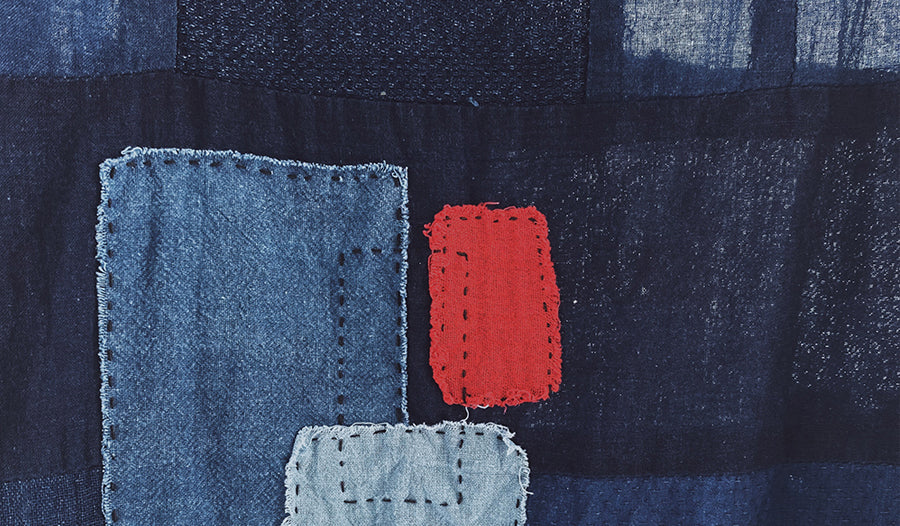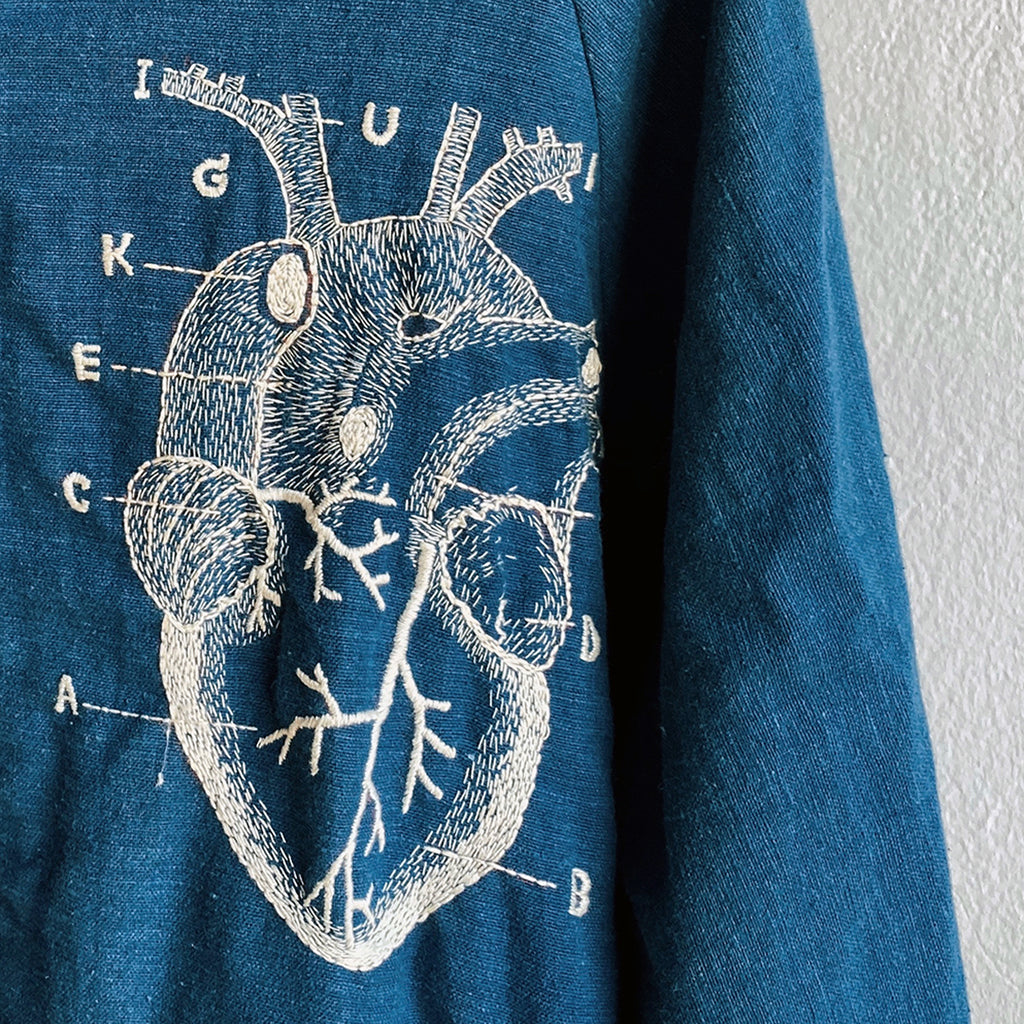
The Long Thread: Farmer Rangers

Based in Thailand, the clothing brand Farmer Rangers, co-founded in 2018 by Jamorn and Kung, is experiencing interest worldwide. Prior to Farmer Rangers, this duo had a brand called UYU AYA that offered simple, natural and handmade clothing, accessories, and products. Jamorn and Kung have a vision for Farmer Rangers: to take old, discarded textiles and garments and transform them into new, artisanal, wearable items. These never-to-be-repeated pieces have a strong appeal for those wishing to demonstrate their individuality, and for those who despair of the amount of clothing that goes to landfill.
Jamorn and Kung search for materials and experiment with their team in both Thailand’s capital, Bangkok, and Chiang Mai, a city in northern Thailand’s mountainous region. Salvaged stock is recycled and reworked using the hand-techniques of cutting, piecing, patching, layering, quilting, stitching, repairing, mending, darning, and embroidery. Such skills become essential design features and their aesthetic celebrates an old-world charm. Cleverly and carefully designed, the scraps with their haphazard, clashing colours, textures, and patterns are coerced into balanced harmony. The Farmer Rangers label pictures an old-fashioned pair of large scissors, aptly describing the start of their design process–cutting. This visual is accompanied by ‘Inspiration + Nature’–words denoting their fundamental mantra.

The collage technique of a hand-stitched patchwork of squares, rectangles and misshapes allows for variation where whatever is available is worked with. Fragments are reassembled in interesting ways and frayed edges are celebrated for their attractive textures and changes of colour. Mending methods also come to the fore. Passed down from times of economic austerity through generations, darning to heal rips and tears is enjoying a renaissance. Instead of blending into the original textile, darning is brought to attention by way of colour, texture, and pattern contrasts. This modern approach makes mending visible that, historically, was intended to be invisible.

More complex items utilise the skill and patience required for hand embroidery. The body of one Farmer Rangers indigo-dyed jacket is covered with white bullion knots – providing both a foil to the deep blue of undecorated sleeves and relief surface interest. The effect is stunning and this statement piece is also reversible to enable a different look. Most of their designs gravitate to the oversized and unstructured–loose-fitting for comfort and ease of movement, while some are versatile being unisex and/or reversible. Lightweight gauze cottons are ideal for summer and layered, stitched cottons add warmth for winter. To give full attention to the worked textiles, garments are simply cut, often referencing workwear and traditional clothing such as Japanese haori jackets. Bags, such as large totes, are a canvas to show off intricately sewn textiles, almost becoming portable artworks. Berets, beanies, and bucket hats receive similar treatment and finish off an outfit, while masks provide protection.

Favoured materials tend to be lightweight and super-soft, whereas colours incline towards naturals–earthy browns, sky/sea blues, vegetation/foliage greens. The sourced materials and garments are re-dyed using natural dyes such as indigo and ebony. Pigment for ebony dye is obtained from pulped berries of the fruit from the ebony tree, which can be fermented to achieve a rustic colour and texture. Ebony (makrua in Thai) is a traditional dye of northern Thailand where villagers engaged in their farming duties wore ebony-dyed workwear–a simple short-sleeved shirt and trousers. Both indigo and ebony dyeing use cold dye baths and cumulative processes for a myriad of shades of blue with indigo and greys and browns to black with ebony. Dyeing can take days as items are dipped multiple times to reach the required depth of colour. For a fully saturated blue or black, the fabric can be dipped from twenty-five up to forty times. Between each dip the cloth or garment is spread out in direct sunlight to dry, as the dyeing agent oxidises the colour as it appears and the sun helps the dye intensify and set. In both cases the dye does not damage the fabric and it lasts for a long time, not being overly affected by light or washing.

Jamorn and Kung collaborate with villagers from areas such as Sop Poeng in the Mae Taeng District of Chiang Mai Province. Hand-sewn techniques means contributors can sew at home, carefully piecing reclaimed materials together to create pieces destined to be loved once more. Evidence of the human touch via handcraft is currently witnessing a resurgence and ancient techniques used to prolong the life of clothing are being looked at afresh – boro and sashiko in particular, where Farmer Rangers have a contemporary take. Their purposeful contrasting of abstract patchwork results in joyful clothing. Dashes and splashes of a strong coloured fabric or thread such as purple berry, fiery red or intense green visually highlight an amalgamation of darks. Joining differently coloured fabrics and using a further contrasting thread offers an eclectic look that excites the eye. The hand stitch work has a beauty of its own, especially when deviations and imperfections are accepted. Evidence of the human hand appeals to us as a welcome alternative from machine-made perfection. Irregularity is preferred over the predictability of the digital, where ‘mistakes’ are automatically corrected.

Farmer Rangers’ clothes and accessories are expensive; with their prices reflecting the hours of devoted craft, skill, and time needed to create a piece. Built to last, for those who are able to invest, these are set to become heirloom pieces. Taking old and making new, Farmer Rangers are turning would-be waste into desirables that have an inherent vintage, time-honoured appearance.
Here, textiles and clothes are respected, revered, and reinterpreted to create looks that entrance today’s fashion and eco-aware audience. This is clothing with integrity and soul.
Written by Sarah E. Braddock Clarke
Find out more about Farmer Rangers in their Selvedge World Fair profile. Browse their upcycled and hand-stitched textiles here: Farmer Rangers artisan goods
Farmer Rangers exhibited as part of the Selvedge World Fair, which took place online from 1 - 4 September 2021.

2 comments
Thank you so much for htis information. Do you have any advice how to wash these old jackets? I’m terrified the indigo dye will bleed into the beautiful but very dirty embroidered edges/hems etc.
Any advice very much appreciated.
what Timing I am just starting to explore Boro !